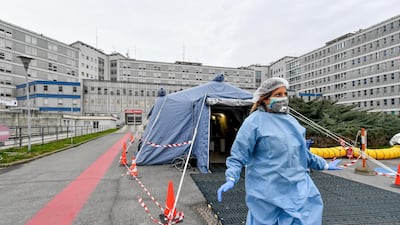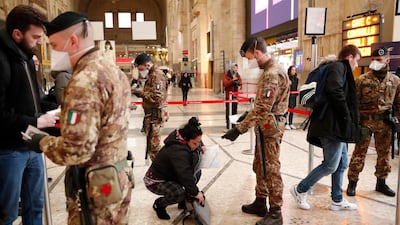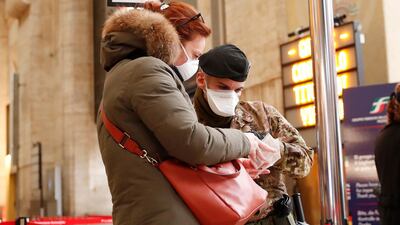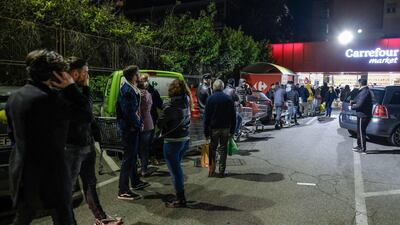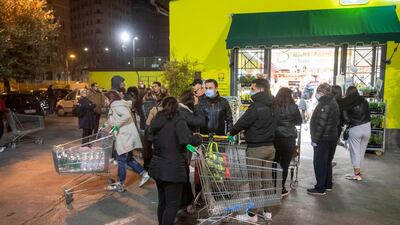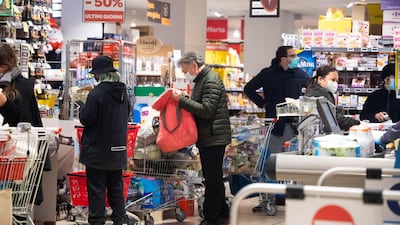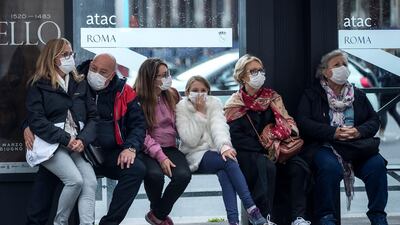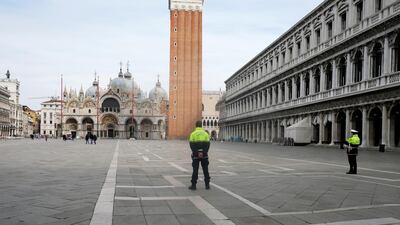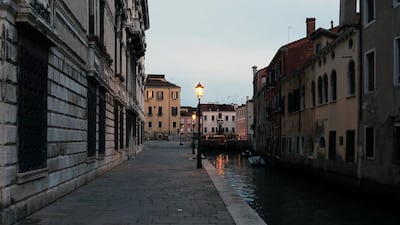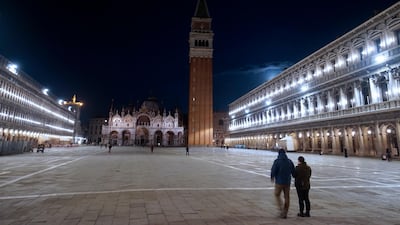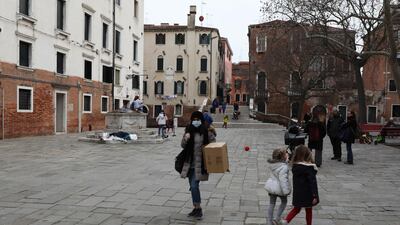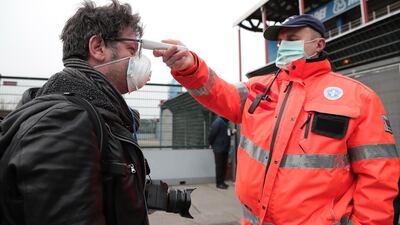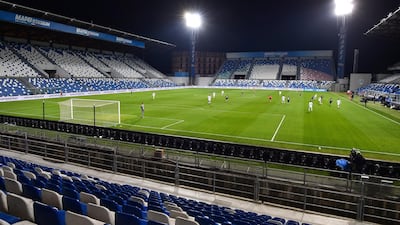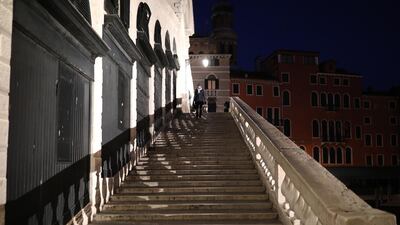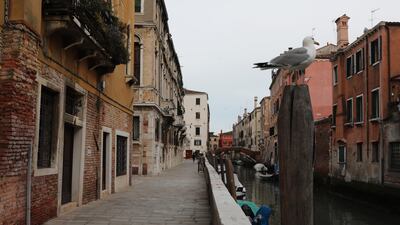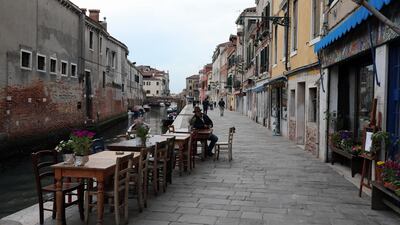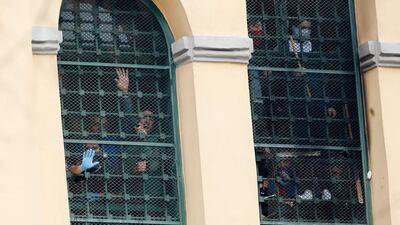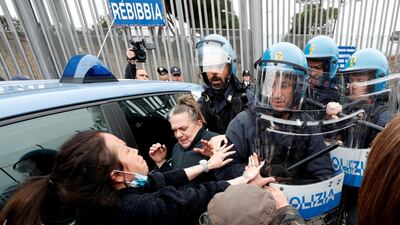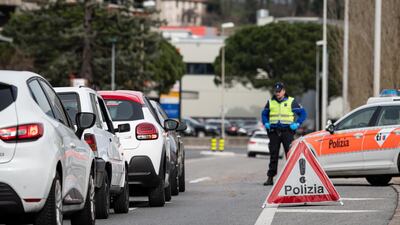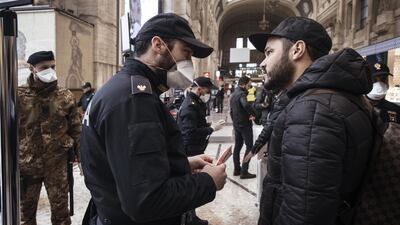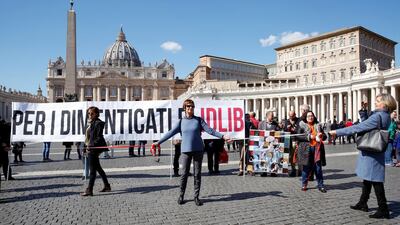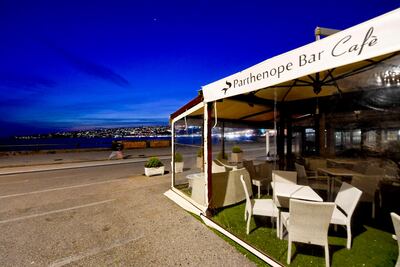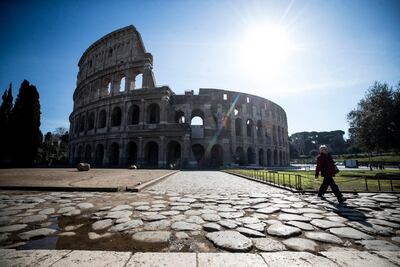Yesterday, Italy completed day one under complete quarantine after authorities extended the blanket of travel restrictions across the entire country in a bid to contain the spread of Covid-19. The measures, which had already been in place in the hardest-hit northern regions of the country, are now nationwide and will remain until at least Friday, April 3.
They came as the country recorded more than 10,000 cases of Covid-19, and reported the highest number of deaths outside of China. According to Italian Prime Minister Giuseppe Conte, the entire country is now a "protected area".
Life under quarantine
Across the country, Italians are adjusting to life under the new restrictions. People can no longer move freely as travel is now allowed only for essential work, health reasons or other emergencies.

Elizabeth Heath, a travel writer based in Umbria, told The National that authorities are asking people to avoid all non-essential movement from their homes. "We can go out, to the grocery store or pharmacy etc but we're being asked to avoid all non-essential movement from the house," she says.
Education establishments across the country are also closed, so Elizabeth’s daughter is not at school. “I’ve been sending her to her nonna’s [grandmother's], but now they’re saying to not even do that, to keep everyone at home."

Known for its green hills and valleys, life in laid-back Umbria is now even slower. And in Italy's big cities, where tourists make the country the world's fifth-most visited, life has also slowed.
The boisterous buzz of Rome has calmed as travellers stay away from the Eternal City. In Venice, a city that has battled with overtourism for years, attractions have become ghost towns – Rialto, the Bridge of Sighs and the Piazza San Marco left for the pigeons to explore.
Following the rules: keeping distance in lines and documentation needed

Italy is the first democratic country to enforce such dramatic measures in response to the spread of the coronavirus. Other countries are likely to be watching closely to see how well it works.
And Italians, for all their fiery reputation, seem to be obediently following the new rules.
“There’s no enforcement in the martial sense,” said Heath. “It seems like people are obeying for the most part – if anything it’s been a unifying period.”
Restrictions on visiting grocery stores are in place in some destinations across Italy, with only one member of each household allowed to leave home to buy groceries at a time. Customers wait in lines outside supermarkets, standing a metre apart, before being allowed into shops a handful at a time.

The nationwide habit of baci e abbracci (kissing and hugging) friends when meeting has also stopped. Handshakes are out too, according to guidelines from authorities.
In cities, public transport continues to operate, albeit on a scaled back level. In some regions, police vehicles are driving around neighbourhoods, encouraging people to stay home.
For people who do need to travel, self-certification documents need to be completed.
Heath's husband is a stonemason – a job that does not involve much public interaction meaning he can continue to work during the restrictions. On his daily commute to the nearby town of Orvieto, he is now accompanied by a completed documento di autocertificazione.
"The police will periodically set up road blocks and if he gets stopped, he shows them this form. The officers will sign it – as he has justification to travel because he's working – and then he'll just keep it with him in case he is stopped again," says the travel writer.
Anyone found making a false declaration faces a sentence of up to three months in jail or a hefty fine.
The measures seem to be “designed to prevent people from making frivolous trips or going from the town they live in to visit their parents in another region, when they might be carrying the virus with them," explains Heath.
Yet, even before the extension of these emergency measures, Italy wasn’t functioning normally.
The slowest low-season
“The only bright spot is that apart from ski areas, this is currently low season for most of the country," says Heath. That season has ended early, with Italian ski resorts shutting until further notice to help prevent coronavirus spread.
Across the country, public gatherings, including concerts and weddings are cancelled. All museums, theatres, nightclubs and cinemas are closed.
Bars and restaurants can stay open, although many have chosen to close. Those that are open can only operate from 6am to 6pm and must follow strict controls to ensure customers are seated at least one metre apart. Failure to comply will lead to authorities shutting places down.

Tourism hot spots across the country were deserted on Tuesday, as the country's new travel restrictions came into force. Just a handful of people roamed around outside Rome's Colosseum on Tuesday – the famous site is closed to visitors.
Nearby, at The Trevi Fountain – a landmark that typically attracts an estimated 1,200 people per hour – streets were deserted. In Venice, the usually thronging Rio di Palazzo was eerily quiet.
“The travel industry is being devastated by this,” says Heath.
Hotel shutdowns

With a rising number of cases in Italy, several countries advised travellers against travel to the country before the shutdown period. “Some restaurants were already opting to close before the 'lockdown', both for safety reasons and because they had no business,” says Heath.
Since the emergency measures were extended, this has expanded and “many hotels, restaurants and non-essential businesses are closed," she adds.
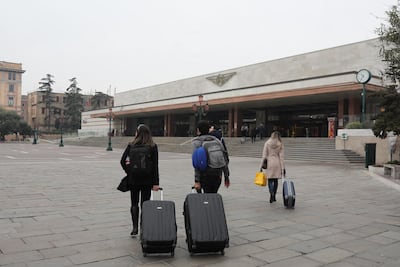
According to the Italian tourism association, €200 million (Dh831 million) of travel bookings were cancelled in March. This figure is based on data from Italy’s hotels, guesthouses and travel agencies, but does not count cancelled revenue from tours, transport and restaurants.
Some of the larger hotel groups have implemented cancellation waivers for guests that were due to visit Italy. Hilton – owners of multiple Italian hotels including Rome Cavalieri, a Waldorf Astoria hotel and the Grand Hotel Villa Torretta Milan Sesto – has modification and cancellation waivers in place for guests travelling to, through or from Italy in March.
The Armani Hotel Milano is temporarily closed, with no bookings being accepted until at least Thursday, March 26. The group announced it was also closing its stores and restaurants in the city. Giorgio Armani also announced a donation of $1.43 million dollars to hospitals across the country.
The Marriott group, owners of several properties including the Rome Marriott Grand Hotel Flora and The St. Regis Florence, has extended its cancellation policy to cover all its hotels across the country. Elsewhere, Mandarin Oriental Lago Di Coma which was due to open for the season on Wednesday, March 18, will remain closed until Friday, April 10.

For Barbara Ricci, owner and manager of Rome's Hotel Adriano, the travel restrictions have forced her to stop accepting guests at her 17th-century property.
"We kept Hotel Adriano open until this week, but once a group of Dutch travellers leave today, we've decided to close until the end of the suspension of travel imposed by the government."
Located in the heart of Rome, close to the Pantheon and the Spanish Steps, Ricci has had the perfect vantage point to see the city slide into stillness.
"Restaurants and bars are open only until 6pm, museums and main monuments are closed and there's only a few travellers, those who arrived in the last few days, still visiting the city. Soon they will leave and we don’t know when this emergency will be considered over," she says.
This impact on smaller hotels and family-run businesses have Heath worried.
"The fear is that a lot of small, family-run businesses, part of what makes Italy so special, will not survive this crisis. The big brand hotels will survive, but my worry is that we’ll be left with an Italy that is more homogeneous than before.”
Cancelled flights
Since the expansion of travel restrictions across the country, several airlines have cancelled flights to and from Italy.
British Airways has cancelled all its flights to and from Italy. From the UAE, Emirates is suspending its daily flight to Venice from Thursday, March 12 to Tuesday, March 31. The Dubai airline is also reducing services on its Dubai to Milan route, and its services to Rome.
Norwegian Air has temporarily halted flights to the country because of the coronavirus outbreak, as have Ryanair, American Airlines and Delta. Travellers will be allowed to fly in and out of Italian airports, but will have to justify their movements and submit a self-declaration travel form at boarding gates when departing.
Looking to the future
With the entire country having slowed to a halt, Italians are readjusting to what is, for now, their new normal.
The future impact that the quarantine will have on Italy's tourism industry, a sector that accounts for more than 13 per cent of the country's GDP, is not yet known. For Heath, she hopes the country can soon return to la dolce vita.
“We hope that once the dust has settled, people will enthusiastically return to Italy and help the country recover." says Heath.
"For anyone thinking of visiting Italy when the crisis has passed there will surely be great deals on flights, hotels and packages. And travellers will find a country, and a people, very, very happy to welcome tourists back."
